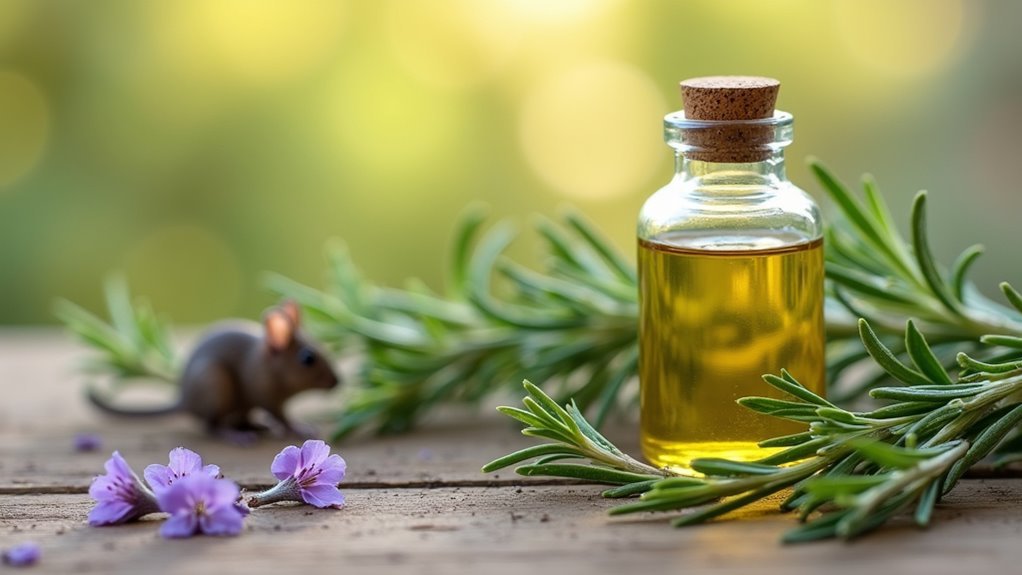You’ll achieve the best results by creating your own rosemary oil repellent using 10-15 drops of pure rosemary essential oil mixed with 2 cups of water and mild soap. For enhanced effectiveness, combine it with peppermint oil since it’s more potent and lasts longer. Apply this mixture at entry points, pathways, and nesting areas, reapplying every 1-2 weeks. This DIY approach costs 60% less than commercial products while offering superior customization for your specific rodent problem and home environment.
Understanding How Rosemary Oil Repels Rodents

While many commercial rodent repellents rely on harsh chemicals, rosemary oil offers a natural alternative that’s both effective and safe for your home. The secret lies in rosemary oil’s powerful compounds, including cineole and camphor, which create strong aromas that rodents find extremely unpleasant.
These scents work by overwhelming their sensitive noses, making treated areas uncomfortable for mice and rats.
Rosemary oil’s potent aromatics create an overwhelming sensory experience that drives rodents away from treated spaces naturally.
What makes rosemary oil particularly effective is its ability to mask the pheromones that typically attract pests to your property. When you apply rosemary oil around entry points, you’re fundamentally creating an invisible barrier that disrupts their natural scent-tracking abilities.
This dual action—repelling through strong aromatics while blocking attractant signals—makes rosemary oil a thorough solution for keeping rodents away naturally.
Top-Rated Rosemary Oil Rodent Repellent Products
When you’re shopping for rosemary oil rodent repellents, you’ll find products that vary greatly in their concentration and effectiveness against mice.
Most top-rated options offer multiple application methods like sprays, sachets, or concentrates that you can dilute yourself for targeted use around entry points.
You’ll also want to prioritize products that explicitly state they’re safe for pets and children, since many commercial repellents combine rosemary with other essential oils that might affect sensitive animals.
Effectiveness and Potency
Since rosemary oil’s natural compounds like cineole and camphor create a powerful deterrent effect, you’ll find that the most effective products harness these aromatic properties to keep rodents at bay.
The strongest rodent repellent formulations typically combine rosemary with complementary essential oils like peppermint or lemongrass, amplifying their pest-deterring capabilities.
However, you should understand that rosemary oil’s effectiveness has limitations. The scent diminishes over time, requiring frequent reapplication to maintain potency.
Mice can gradually adapt to familiar odors, reducing the repellent’s long-term impact. While these natural solutions provide temporary relief and work well for minor rodent issues, they’re not as powerful as professional extermination methods for severe infestations requiring permanent solutions.
Application Methods Available
Understanding rosemary oil’s potency helps you choose the right application method for your specific rodent problem. You can create an effective spray by mixing several drops of rosemary oil with water and mild soap in a spray bottle, then targeting entry points around your home.
For concentrated deterrence, place cotton balls infused with rosemary oil in areas where you’ve spotted mice frequently.
You’ll find enhanced results by combining rosemary with other essential oils like peppermint or lemongrass, preventing mice from adapting to single scents.
Alternatively, create a DIY rosemary-vinegar spray by steeping chopped leaves in apple cider vinegar for 1-2 weeks. Remember to reapply regularly since the scent diminishes over time.
Safety for Pets
Unlike harsh chemical rodent repellents that pose serious risks to your furry companions, rosemary oil offers a pet-safe alternative that won’t compromise your household’s well-being.
You can confidently use this natural rodent repellent around cats, dogs, and other pets without worrying about toxic exposure.
When applying rosemary oil solutions, dilute them properly to prevent overwhelming your pets’ sensitive noses.
Create DIY sprays or place rosemary-infused cotton balls near entry points to maintain an effective barrier against rodents while keeping your animals safe.
You’ll need to reapply the oil regularly for consistent protection.
Monitor your pets initially for any unusual reactions when introducing this new scent, though adverse effects are rare with this gentle, natural rodent repellent option.
DIY Rosemary Oil Spray Recipes for Mouse Control
Three simple ingredients can transform your kitchen into a mouse-deterrent production facility. You’ll need rosemary essential oil, water, and mild soap to create an effective spray that targets mouse entry points.
| Spray Type | Main Ingredients | Application Area | Reapplication |
|---|---|---|---|
| Basic Rosemary | Rosemary oil + water + soap | Entry points | Weekly |
| Enhanced Blend | Rosemary + peppermint oils | High-traffic areas | Bi-weekly |
| Vinegar Infusion | Rosemary leaves + apple cider vinegar | General deterrent | Monthly |
| Cotton Ball Method | Diluted rosemary oil | Active nesting spots | As needed |
For maximum effectiveness, combine rosemary oil with peppermint oil and spray around frequently visited areas. Alternatively, steep chopped rosemary leaves in apple cider vinegar for 1-2 weeks, then strain for a potent deterrent. Remember that regular reapplication prevents mice from adapting to these natural repellents.
Comparing Rosemary Oil Vs Peppermint Oil Effectiveness

While rosemary oil proves effective in deterring mice, peppermint oil consistently outperforms it in head-to-head comparisons. You’ll find that peppermint oil’s intense menthol scent creates immediate impact, making rodents avoid treated areas more effectively than rosemary’s milder aromatic compounds like cineole and camphor.
However, you shouldn’t dismiss rosemary oil entirely. When you combine both oils, you’ll enhance your deterrence strategy since multiple scents prevent mice from adapting to single aromas.
You’ll also notice that peppermint oil requires less frequent reapplication due to its potency, while rosemary oil needs more consistent renewal.
If you’re choosing between them, peppermint oil offers stronger repelling power. But for maximum effectiveness, you’ll achieve better results using both oils together rather than relying on either one alone.
Proper Application Methods for Rosemary Oil Repellents
You’ll need to master three key elements to make rosemary oil an effective rodent deterrent in your home.
Getting the right oil dilution ratios guarantees you’re creating a potent solution that won’t damage surfaces while still repelling mice.
Strategic placement techniques and consistent reapplication schedules will determine whether your rosemary oil treatment becomes a long-term success or just a temporary fix.
Oil Dilution Ratios
Getting the dilution ratio right determines whether your rosemary oil repellent will effectively deter rodents or simply waste your essential oil. The ideal oil dilution ratios call for 10-15 drops of rosemary essential oil mixed with 2 cups of water and a few drops of mild soap. This concentration provides sufficient potency without overwhelming the area or wasting product.
You’ll want to maintain these precise measurements for consistent results. The soap acts as an emulsifier, helping the oil blend properly with water instead of separating.
For cotton ball applications, use the same ratio but reduce the water amount proportionally.
Consider combining rosemary with peppermint or citronella oils at similar dilution ratios to boost effectiveness while maintaining the proper concentration for safe, effective rodent deterrence.
Strategic Placement Techniques
Three critical zones require your immediate attention when applying rosemary oil repellents: entry points, active rodent pathways, and nesting areas. You’ll maximize effectiveness by targeting cracks around doors, windows, and foundation gaps where mice enter your home.
Place cotton balls soaked in diluted rosemary oil throughout cupboards, corners, and behind appliances where rodents travel frequently.
Don’t overlook basements, attics, and storage areas where mice establish nests.
Use a spray bottle to distribute your rosemary oil mixture evenly across larger surfaces and hard-to-reach spaces. This method guarantees thorough coverage along baseboards and wall joints.
Refresh your repellent applications weekly, as scent intensity diminishes over time.
Combine rosemary with peppermint or lemongrass oils to prevent mice from adapting to single-scent barriers.
Reapplication Schedule Guidelines
Maintaining consistent repellent potency requires establishing a structured reapplication timeline that accounts for environmental factors and rodent behavior patterns.
You’ll need to reapply rosemary oil every 1-2 weeks to effectively repel mice, as their olfactory senses adapt to familiar scents over time.
Monitor cotton ball placements weekly and refresh them when the scent weakens. Environmental factors demand immediate attention—reapply after rainfall, heavy cleaning, or high humidity conditions that diminish oil effectiveness.
Don’t assume initial success means permanent results. Persistence prevents mice from returning to previously treated areas.
Check entry points regularly and maintain spray bottle solutions with fresh oil concentrations. Your reapplication schedule should prioritize high-activity zones and vulnerable access points for maximum deterrent impact.
Safety Considerations When Using Rosemary Oil Around Pets
While rosemary oil can effectively deter rodents, you’ll need to exercise caution when using it around your furry companions.
Although this rat repellent is generally safe for pets in small amounts, you should always dilute rosemary oil with water or carrier oil before application to prevent adverse reactions.
Before widespread use, conduct a patch test on a small area of your pet’s skin to check for allergic reactions.
Keep the oil out of your pet’s reach and avoid direct application to their fur or skin unless your veterinarian recommends it.
Monitor your pets closely after using rosemary oil in your home.
Watch for signs of distress like excessive scratching, respiratory issues, or other unusual behaviors that might indicate sensitivity to the scent.
Best Areas to Place Rosemary Oil Rodent Deterrents

Strategic placement of rosemary oil deterrents maximizes their effectiveness against rodent infestations.
Proper positioning of rosemary oil treatments creates powerful barriers that effectively prevent mice from entering your living spaces.
You’ll want to focus on entry points where mice typically gain access to your home. Place oil-infused cotton balls at doors, windows, and wall cracks to create an effective barrier.
The best areas to place rosemary oil rodent deterrents include:
- High-activity zones – Target kitchens, garages, and storage spaces where you’ve noticed mouse signs
- Hidden spaces – Apply oil combinations in attics and basements where rodents often nest
- Perimeter locations – Position rosemary plants around your home’s exterior to mask attractive scents
Remember to refresh applications regularly since the scent diminishes over time.
Combining rosemary with peppermint or citronella oils enhances repelling power and helps keep mice away more effectively.
Combining Rosemary Oil With Other Natural Repellent Ingredients
You can greatly boost rosemary oil’s rodent-repelling power by combining it with other natural ingredients that mice find equally offensive.
Peppermint oil blends create an intensely aromatic barrier, while vinegar-based solutions leverage the acidic properties that rodents naturally avoid.
Multi-oil combinations prevent mice from adapting to single scents and maintain long-term effectiveness in your pest control strategy.
Peppermint Oil Blends
When you combine rosemary oil with peppermint oil, you’ll create one of nature’s most powerful rodent deterrents that outperforms either oil used alone.
The aromatic compounds in rosemary oil, including cineole and camphor, work synergistically with peppermint oil’s menthol to form an effective barrier against rodent entry.
This potent blend enhances repellent properties through their combined strong scents that mice find overwhelming.
You can apply the mixture directly at entry points where rodents are most active.
Key Benefits of Rosemary-Peppermint Blends:
- Enhanced deterrence – Both oils create a more formidable scent barrier than single oils
- Long-term effectiveness – Prevents rodent adaptation to individual scents over time
- Dual purpose – Repels mice while freshening your indoor environment
Regular reapplication guarantees continued protection, making this combination your most reliable natural rodent control solution.
Vinegar-Based Solutions
Adding apple cider vinegar to your rosemary oil repellent creates a powerhouse combination that delivers twice the rodent-deterring punch. These vinegar-based solutions harness both ingredients’ strong aromas to form an effective dual-action deterrent against mice.
To create this potent mixture, combine 1 cup of chopped rosemary leaves with 2 cups of apple cider vinegar. Let it steep for 1-2 weeks, allowing the natural oils to fully infuse into the solution. This creates a concentrated spray that’s perfect for pest control applications.
You’ll benefit from an eco-friendly alternative to harsh chemical repellents while promoting a healthier living environment.
However, you must reapply regularly since scents dissipate over time and rodents can adapt to familiar odors without consistent treatment.
Multi-Oil Combinations
While rosemary oil alone provides solid rodent-repelling power, combining it with other essential oils creates a synergistic effect that’s far more potent than any single ingredient.
Multi-oil combinations prevent mice from adapting to a single scent, making your deterrent strategy more sustainable long-term.
Here are three powerful multi-oil combinations to maximize effectiveness:
- Rosemary + Peppermint Oil – This duo leverages strong scents from both oils to create an enhanced repellent effect that mice find overwhelming.
- Rosemary + Lemongrass Oil – Creates a unique aroma particularly unappealing to rodents, greatly increasing your success rate.
- Rosemary + Citronella + Sage Oil – A triple-threat combination that boosts overall effectiveness, as citronella repels various pests while sage further discourages rodent activity.
How Long Rosemary Oil Repellents Remain Effective
Understanding the duration of rosemary oil’s repellent properties helps you plan an effective rodent control strategy.
Rosemary oil repellents typically maintain their effectiveness for a few days to a week before requiring reapplication due to gradual dissipation of aromatic compounds.
Aromatic compounds in rosemary oil gradually dissipate, requiring fresh applications every few days to one week for continued rodent deterrence.
You’ll need to reapply regularly, especially in high-activity areas or spaces with significant airflow. Environmental factors like humidity and temperature can reduce effectiveness sooner in damp or warm conditions.
Mice may also adapt to the scent after prolonged exposure, diminishing the oil’s deterrent effect over time.
For ideal results, you should establish a consistent reapplication schedule.
Combining rosemary oil with other essential oils can enhance efficacy and prolong the deterrent effect, potentially extending protection beyond the typical week-long timeframe.
Cost Analysis of Commercial Vs Homemade Rosemary Repellents
When evaluating rosemary oil repellents, you’ll find considerable cost differences between commercial and homemade options that can impact your long-term pest control budget.
Commercial products like Mighty Mint 16oz cost around $19.98, while DIY alternatives require only essential oils and household ingredients. Your cost analysis reveals homemade solutions offer superior value, especially for ongoing use.
Key Cost Considerations:
- Initial Investment – Commercial repellents provide immediate convenience but cost considerably more per ounce than homemade versions.
- Customization Value – You can adjust homemade concentrations for specific needs, potentially improving effectiveness per dollar spent.
- Long-term Savings – Regular replenishment of DIY sprays costs a fraction of repeatedly purchasing commercial products.
Homemade rosemary repellents consistently prove more economical for sustained rodent control.
Limitations and Realistic Expectations for Rosemary Oil Rodent Control
Although rosemary oil offers a natural approach to rodent deterrence, it’s essential to set realistic expectations about its limitations.
You’ll find that rosemary oil repellents provide temporary relief rather than permanent solutions. The strong aroma that initially deters mice will diminish over time, requiring continuous reapplication every few weeks to maintain effectiveness.
Mice are remarkably adaptable creatures, and they’ll often return to favorable environments despite the presence of rosemary oil.
If you’re dealing with severe or persistent infestations, DIY rosemary oil repellents won’t be sufficient on their own. You’ll achieve better results by combining rosemary oil with other essential oils or considering professional extermination services for long-term rodent population control.
Frequently Asked Questions
Does Rosemary Oil Repel Rodents?
You’ll find rosemary oil does repel rodents through its strong aroma containing cineole and camphor compounds. However, you’ll need regular reapplication since mice can adapt to scents over time.
What Is the Best Oil for Rodent Repellent?
You’ll find peppermint oil works best for repelling rodents due to its intense scent. Combining it with rosemary, lemongrass, or eucalyptus oils creates an even stronger deterrent that’s harder for rodents to ignore.
What Is the Most Effective Rodent Repellent?
You’ll find professional extermination services most effective for severe infestations. For natural options, you can combine peppermint, rosemary, and citronella oils with regular reapplication to maintain their repelling power.
What Smell Do Rodents Hate the Most?
You’ll find rodents hate strong, pungent scents most intensely. Peppermint oil, ammonia, and mothballs create overwhelming odors that disrupt their sensitive olfactory systems, making these areas uninhabitable for mice and rats.
In Summary
You’ll find rosemary oil works best when you combine it with other natural repellents and apply it consistently. Don’t expect it to eliminate severe infestations, but it’s effective for prevention and minor problems. You can save money making your own spray, though commercial products offer convenience. Remember to reapply every few days and focus on entry points. Rosemary oil won’t replace traditional methods but provides a natural, safe option for your family.





Leave a Reply